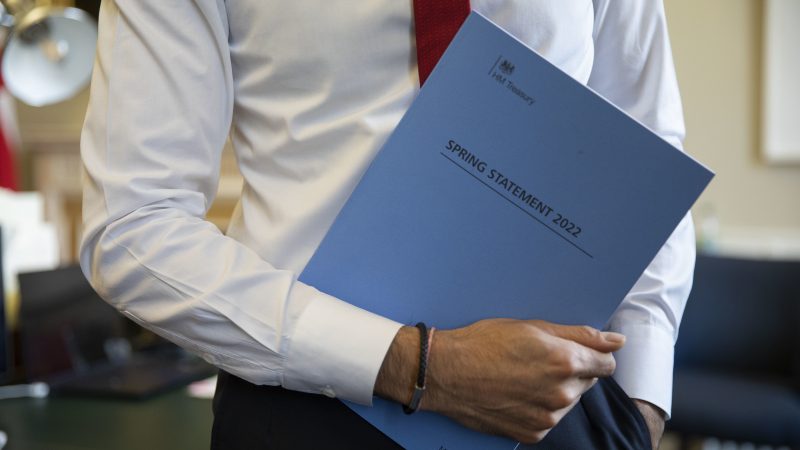
Every working-class person in this country knows that Rishi Sunak’s Spring Statement was a failure. It did nothing to assuage the crushing financial pressures facing us. As The Mirror‘s Friday front page put it: energy bills up, water bills up, council tax up, national insurance up, broadband charges up. Instead, the billionaire Tory Chancellor used the mini-budget as an opportunity to flaunt his Thatcherite credentials, engaging in complex accounting to win faith amongst the Tory faithful. What do the 1.6 million people set to fall into absolute poverty matter next to his leadership ambitions? No wonder 75% of people thought Sunak’s budget didn’t do enough to help them. Meanwhile, bankers and energy bosses are raking it in.
This was an opportunity for Keir Starmer to show that Labour is in touch with the day-to-day concerns of ordinary people. But Labour’s big demand this week was higher defence spending. This is the wrong priority, morally and strategically. Instead, Labour should be setting out an economic alternative to Tory ruin, one the country is crying out for. That means welfare, not warfare. Nurses, not bullets. This is not an abstract question, but a real matter of priorities.
As bills soar, millions are struggling to keep their heads above water. Many of the poorest aren’t succeeding in even that. So when the Resolution Foundation, dedicated to supporting lower-income families, says that benefits and pensions must rise by 8% in line with inflation (instead of the Tories’ measly 3.1%), that is the minimum our Labour value of solidarity demands of us. But Rachel Reeves only called for a rise of 6% – presumably, to showcase Labour’s ability to make ‘tough’ decisions, decisions which only ever hurt the poor.
With the price cap rising by a wallet-busting £700, on energy we must go further still. Whilst Starmer’s call for a windfall tax is welcome in the short term, Labour must address the systemic issues. This means calling for the nationalisation of the energy industry, something with widespread backing across society. As the French example shows, public ownership is vital to limit prices. In an era of climate breakdown and extreme pressures on households’ finances, it is indefensible for energy companies to be making billions in profits. As polling demonstrates, the public would welcome such a change because it would make a difference to what matters most: the money in their bank account at the end of every month. And, while Labour’s energy plan is a vast improvement on the Tories’, it would still leave bills rising by hundreds.
Ours is not a radical proposal, but a common sense one. Now is the time for Labour to show how much difference it would make to people’s lives. That also means demanding public ownership of our scandal-ridden privatised water system, with water bills also rising today. Once again, such a move would be highly popular: for years private water companies have pumped out sewage into our rivers with impunity, all while paying out tens of billions of pounds in dividends to shareholders.
And, as many are forced to pinch pennies, Labour could seize the agenda with a new commitment to public transport. Removing failing franchise models, rolling out free and low-cost travel – as progressive Labour administrations in Manchester and Cardiff are doing – ensuring that towns and villages are connected properly and emissions are reduced. The private sector has demonstrably failed people and planet alike.
Faced with an unpopular Tory government overseeing widespread financial pain, while protecting the rich, two examples present themselves. In 2015, Labour aped Tory framing to neutralise media attacks. A strategy of caution and triangulation – encapsulated by Labour adopting a benefits cap – failed resoundingly. Meanwhile, in 2017 there was a clear dividing line between us and the Tories. While Theresa May told nurses there was no magic money tree, Labour’s dynamic vision talked about public investment and measures to improve the lives of working-class people by taxing the rich. That led to the largest increase in Labour’s vote share since 1945.
Sadly, by trying to out-Tory the Tories, while avoiding popular measures that frighten off the media and corporate establishments, Starmer’s Labour is falling back to the failed strategy of 2015. But Sunak has lost his shine. We should be ramming home a populist alternative, not calling for a second massive defence spending increase in the last 18 months. Labour’s local election launch saw the party rightly attack the Tories for leaving ordinary families more than £2,500 worse off. But, even after Sunak’s ‘let-them-eat-cake’ Spring Statement, Starmer’s ratings actually got worse. It is not enough to criticise the Tories, whose shape-shifting ability to remain in power is well known.
As a party, we must associate ourselves with the alternative – as Socialist Campaign Group MPs have done. A bold socialist programme based on public ownership is not just widely and democratically backed by the whole labour movement, it is popular with the public too. It’s the solution to this cost-of-living crisis. If Labour’s leadership were speaking to the country, they’d throw their weight behind it too.




More from LabourList
‘Hope starts young: Why Labour must tell the story of a better tomorrow’
LGBT+ Labour suspends AGM amid fears of legal action over trans candidates running for women’s roles
‘Hyperlocal messaging can help Labour win elections: Here’s how’